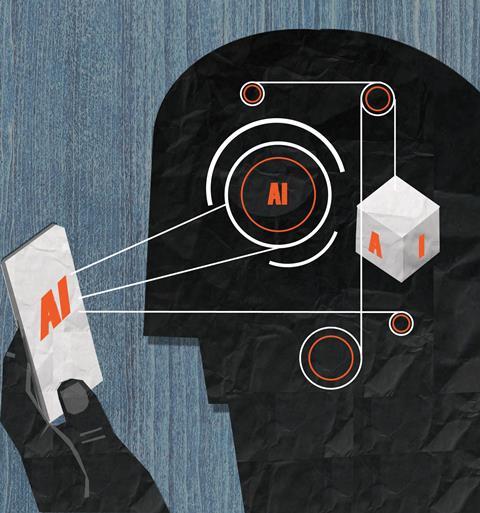Nikolas Kairinos provides a personal perspective on why and how artificial intelligence will shape the legal sector’s future

Where new technology is concerned, artificial intelligence (AI) might just be the most exciting, and widely misunderstood, of them all. In large part, this is because AI is usually discussed in the context of high-tech industries such as robotics and cloud communications, when in reality its impact is likely to be felt most keenly across more established industries not traditionally associated with tech, including law.
A recent study of London law firms conducted by business intelligence firm CBRE revealed that one in two (48%) already rely on at least one AI tool.
Throughout my long career in AI, I’ve seen entire industries change overnight in response to a disruptive new technology or tool, and I think there is every indication that the legal sector is next in line for mass disruption. Ultimately, legal professionals have been keen to integrate AI and machine-learning tools because of their potential to revolutionise the way firms complete administrative tasks. However, if adoption levels continue to rise, I expect to see AI change the way that everything from due diligence to practice management is conducted.
The challenge for firms is to begin to play a more active role in shaping the future of the industry, by working with developers to ensure that AI does not undermine the ability of firms to uphold high ethical and professional standards.
How will AI change the legal profession?
For individual law firms, AI is set to play an important role in making them more operationally efficient. This is primarily because of AI’s natural capacity to streamline procedural work and create new, innovative ways of managing the thousands of documents, contracts and payslips that modern law firms spend so much of their energy managing.

However, AI’s contribution to the legal sector is not limited to automating this kind of work. It has the potential to support every aspect of the legal profession, from drafting contracts to predicting which lines of argument are most likely to succeed in a given case.
Perhaps the most immediate application of AI is in allowing firms to better manage and index their vast digital libraries. In particular, AI-enabled document-extraction tools remove the need for firms to spend valuable time trawling through legal libraries. It goes without saying that this has huge consequences for firms’ ability to carry out legal research across both contentious and non-contentious practice areas.
When it comes to drafting contracts, AI tools already exist which can be used to automatically generate the required document based on the answers a lawyer gives to a brief series of questions. This works by flagging patterns across thousands of documents and cross-referencing them against a human assessment of the document’s usefulness and accuracy.
There are three key benefits to AI-driven contract drafting.
- Automation ensures you are not wasting time drafting similar or identical documents over and over again.
- Human error is removed from the review process, so typos and incorrect clauses cannot find their way into a contract and cause problems later.
- It makes indexing key files easier and more logical.
While it might come as a surprise to some within the industry, AI tools have already demonstrated their ability to predict the outcome of cases before they take place. This works because of AI’s ability to recognise patterns within huge amounts of historical data. This development could not only help firms decide which cases to take on, but also actively change the way a case unfolds, by giving the legal team a degree of foresight about how similar cases usually play out, to help them understand how likely a case is to be successful, as well as the strengths and weaknesses of the proposed argument.
However, expectations must be realistic: there is no widely available tool which claims to predict cases with the highest degree of accuracy. However, there’s nothing to say that we won’t see such proficient technology in the coming years.
Are the risks to lawyers real?
Many in the industry approach the disruptive changes brought about by AI with some trepidation, because these new efficiencies threaten to undermine their place within the profession, or even replace them entirely. However, the ultimate aim of these new AI-enabled technologies is to ensure that firms offer a higher quality, more consistent service.
AI tools are designed to improve lawyers – not replace them
Indeed, I’ve seen the impact that integrating AI has had across a number of different industries, and I believe it would be unrealistic to expect even the most advanced AI tools to outperform highly trained legal professionals when it comes to more complex tasks.
AI should be seen as a great servant but a bad master: a tool designed to augment the work of legal professionals, not direct it. Ultimately, AI tools are designed to improve lawyers – not replace them – by making their lives easier, and quickly giving them access to the most useful and relevant information available. For instance, while there are products such as DoNotPay which utilise chatbot technology to deliver basic legal advice, lawyers will still be required for the foreseeable future for anything more nuanced or consequential.
Speaking as someone embedded within the European tech community, I know that the primary aim of most developers is simply making legal services more affordable and accessible. This will be of benefit to more than just the bigger firms. Legal professionals at every level of the industry will be able to take on more clients and deliver a better service with the help of AI. AI could be of particular value to public law lawyers who, having been badly hit by legal aid cuts, are increasingly forced to fight more battles with fewer resources. Ultimately, AI is a dynamic and flexible technology, and as it matures, I envisage there being tools specifically designed to supplement lawyers at all levels of the industry.
What ethical considerations are at play?
While AI has a multitude of potentially industry-reshaping applications, it’s important that legal professionals don’t allow disruptive technologies to undermine their ethical standards.
Many ethical considerations arise from the widespread integration of AI within legal offices.
For the tools to be effective, they must have access to vast amounts of case data. Of course, not all this information will be sensitive (much of it will be of the sort that is presently publicly available), but it is without doubt that the new age of ‘big data’ will require firms to raise their game when it comes to data security.
Business leaders need to think critically about whether anything could be lost in the transition from human workers to AI. This is of particular concern in client-facing roles – even the most sophisticated AI is a long way from being capable of answering hyper-specific legal queries, let alone being able to offer guidance or empathy when the situation requires it.
Processes should not be automated either for the sake of it or because the prospects of savings are too attractive. Every law firm faces its own unique challenges. In the same way that you would consider the structure and ethos of your firm when hiring, you should undertake the same approach when deciding whether to integrate AI into your service offering, and if so, which tools to use. Remember, just because you can automate a process does not mean that you should.
Why AI is the future of law
While for many, the legal sector evokes images of silk robes and powdered wigs, many within the legal profession are leading the charge towards a fully automated future. Dynamic firms are always thinking of new ways to lessen the burden of routine administrative work, and they are increasingly looking to AI.
While AI is set to disrupt the legal world hugely over the coming years, it’s important that senior partners maintain an emphasis on the very human skills and instincts that have made their companies successful in the past. Digital technology can always save on labour and costs, but AI tools are designed to provide firms with more information, not to entirely dictate the correct response to every decision. Technological advancement needs to be seen as a means towards a more humane and efficient legal sector. It should not be seen as an end in itself.
As an innovator in AI, I’m excited by the improvements that AI tools have already made to how law firms operate. However, if AI is to truly realise its potential, then legal professionals have to adopt a more innovative and less rules-based mindset.
The full extent of AI’s utility to the legal sector is yet to be seen. For the time being, legal professionals should aim to work with experts from the world of AI to ensure that law firms can benefit from technological advances without risk of being ethically compromised.
Ultimately, with a proper understanding of AI’s strengths and limitations, lawyers can begin to make their firms more technology- and data-driven.
If you want to know more…
…about AI in the legal sector, read Fountech’s new white paper which explores how law firms might integrate AI into their business.
















